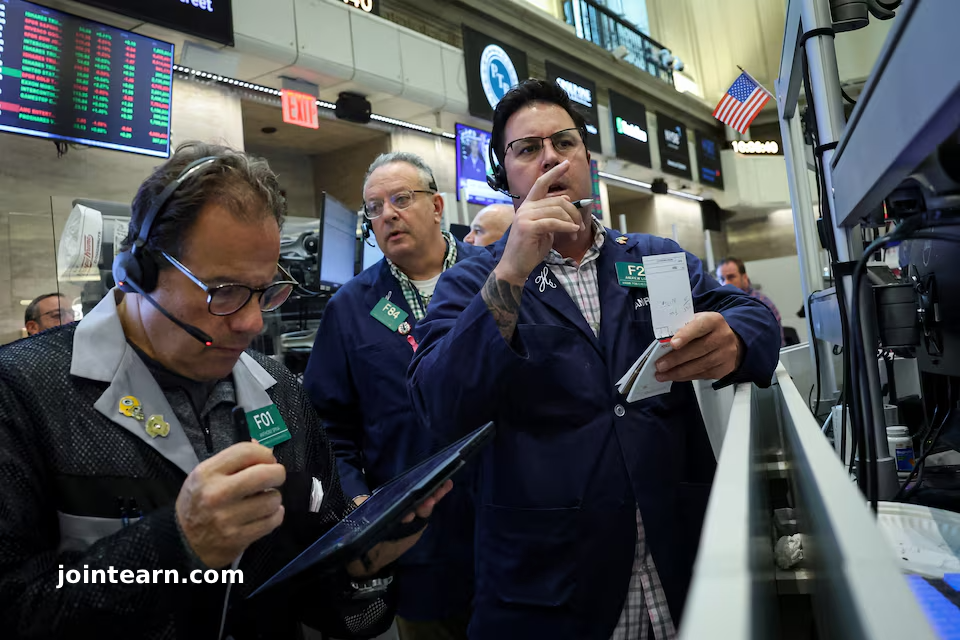
Wall Street Futures Muted as Tesla and IBM Results Disappoint Investors
NEW YORK, October 23, 2025 — U.S. stock futures were subdued on Thursday, as disappointing earnings from Tesla and IBM weighed on investor sentiment. Meanwhile, escalating U.S.-China trade tensions and a lack of key economic data due to the ongoing government shutdown added to the uncertainty clouding the markets.
At 05:43 a.m. ET, Dow Jones futures fell 0.25% (down 116 points), while S&P 500 futures slipped 0.01%. The Nasdaq 100 futures edged up 0.03%, signaling a cautious start on Wall Street after several indexes flirted with record highs earlier in the week.
Tesla Misses Profit Estimates Despite Revenue Beat
Tesla (TSLA.O) shares dropped 3.3% in premarket trading after the company’s third-quarter profit fell short of Wall Street expectations. Although Tesla posted a slight revenue beat, investors reacted negatively to fading optimism around demand growth and rising production costs.
The results marked the beginning of the “Magnificent Seven” earnings season, with tech giants like Apple, Microsoft, Nvidia, and Amazon set to report next. Collectively, these companies represent nearly 35% of the S&P 500’s total market capitalization, giving them outsized influence on overall market direction.
IBM Shares Sink on Cloud Growth Slowdown
Shares of IBM (IBM.N) tumbled 6.6% in premarket trading after the company reported slower growth in its cloud computing and software division — a key profit driver. The weaker results from the tech giant reinforced investor worries about cooling enterprise demand and stiff competition in the artificial intelligence and hybrid cloud markets.
Broader Market Caution Amid Earnings Season
While a majority of U.S. companies reporting so far have outperformed earnings forecasts, many have issued conservative forward guidance, dampening investor enthusiasm. Market analysts say that profit-taking and valuation concerns are now shaping short-term sentiment, especially as the S&P 500 trades near historic highs.
Movers and Shakers in Premarket Trading
- IonQ (IONQ.N) and Rigetti Computing (RGTI.O) surged over 12% each after reports that the Trump administration was considering taking equity stakes in quantum computing firms in exchange for federal funding.
- D-Wave Quantum (QBTS.N) soared 16.7% on the same report.
- Molina Healthcare (MOH.N) plunged 20.8% after cutting its full-year profit forecast.
Other health insurers followed: Centene (CNC.N) dropped 6.2%, UnitedHealth (UNH.N) slipped 1.6%, and Humana (HUM.N) lost 1.6%. - Intel (INTC.O) dipped 0.4% ahead of its quarterly earnings release later Thursday.
- T-Mobile (TMUS.O) and American Airlines (AAL.O) both rose over 1% before their respective reports.
Data Drought Deepens as Government Shutdown Continues
Thursday’s usual weekly jobless claims data will not be published due to the U.S. government shutdown, now in its 23rd day. The delay adds to the uncertainty facing investors who rely on economic data to assess market trends and Federal Reserve policy expectations.
Attention now turns to Friday’s core CPI inflation report, expected to show an annual rate of 3.1%. Analysts say it may be the only key inflation indicator available before the Fed’s policy meeting next week, where markets are already pricing in a 25-basis-point rate cut — with another likely in December.
U.S.-China Trade Tensions Weigh on Sentiment
Investor nerves were further rattled by a Reuters report that the Trump administration is considering broad export restrictions on advanced technology products to China, including laptops and jet engines. The move is seen as retaliation for Beijing’s curbs on rare earth exports, escalating trade hostilities between the world’s two largest economies.
The report pushed markets lower on Wednesday and continues to weigh on global tech sentiment, given the sector’s heavy reliance on supply chains connected to China.
Outlook: Investors Brace for Volatility
With earnings from key tech giants on the horizon, limited economic data, and geopolitical uncertainty, analysts expect near-term volatility in U.S. markets. “Investors are being forced to rely more on company fundamentals and less on macro data right now,” said one strategist, adding that corporate guidance will likely dictate short-term market moves.


Leave a Reply